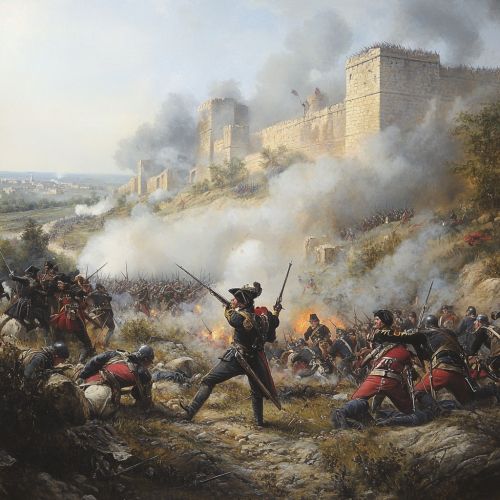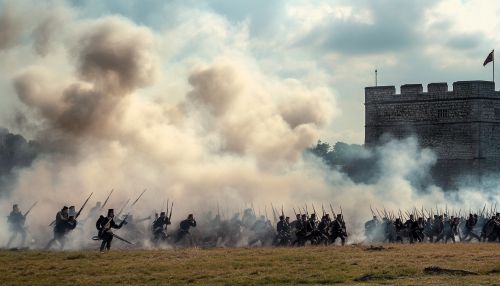Battle of New Orleans: Difference between revisions
(Created page with "== Background == The Battle of New Orleans was a significant military engagement that took place during the War of 1812 between the United States and the United Kingdom. The battle occurred on January 8, 1815, and was the final major battle of the war. Despite being fought after the signing of the Treaty of Ghent, which officially ended the war, the battle was crucial in shaping the post-war perception and morale in the United States. The American forces, le...") |
No edit summary |
||
| Line 19: | Line 19: | ||
The battle commenced with a British artillery bombardment, followed by an infantry assault. However, the American forces, utilizing their advantageous position and superior marksmanship, repelled the British attack. The British suffered heavy casualties, including the death of Major General Pakenham, while the American losses were minimal. | The battle commenced with a British artillery bombardment, followed by an infantry assault. However, the American forces, utilizing their advantageous position and superior marksmanship, repelled the British attack. The British suffered heavy casualties, including the death of Major General Pakenham, while the American losses were minimal. | ||
[[Image:Detail-104433.jpg|thumb|center|Depiction of a battlefield with soldiers in period uniforms engaged in combat, surrounded by smoke and the backdrop of a fortification.|class=only_on_mobile]] | |||
[[Image:Detail-104434.jpg|thumb|center|Depiction of a battlefield with soldiers in period uniforms engaged in combat, surrounded by smoke and the backdrop of a fortification.|class=only_on_desktop]] | |||
== Aftermath == | == Aftermath == | ||
Latest revision as of 18:37, 18 November 2024
Background
The Battle of New Orleans was a significant military engagement that took place during the War of 1812 between the United States and the United Kingdom. The battle occurred on January 8, 1815, and was the final major battle of the war. Despite being fought after the signing of the Treaty of Ghent, which officially ended the war, the battle was crucial in shaping the post-war perception and morale in the United States. The American forces, led by Major General Andrew Jackson, successfully defended the city of New Orleans against a larger British force commanded by Major General Sir Edward Pakenham.
Prelude to Battle
The War of 1812 was primarily driven by issues such as trade restrictions imposed by Britain, the impressment of American sailors into the British Navy, and British support for Native American tribes against American expansion. As the war progressed, the British sought to capture New Orleans, a vital port city that controlled access to the Mississippi River and the interior of the United States.
In late 1814, British forces began their campaign to seize New Orleans. They assembled a formidable force in the Gulf of Mexico, intending to launch an assault on the city. The British strategy involved capturing New Orleans to sever American trade routes and gain leverage in peace negotiations.
American Preparations
Major General Andrew Jackson, who had gained fame for his leadership in the Creek War, was tasked with defending New Orleans. Jackson quickly organized a diverse force composed of regular army troops, state militia, free African Americans, Native Americans, and even pirates led by the notorious Jean Lafitte. Jackson's forces were well-positioned along the east bank of the Mississippi River, utilizing the natural defenses of the terrain and constructing fortifications to strengthen their position.
The Battle
On January 8, 1815, the British launched their assault on the American positions. The British plan involved a frontal attack on the American line, which was anchored by the Rodriguez Canal. The British forces, numbering approximately 8,000 troops, faced a well-entrenched American force of around 4,500 men.
The battle commenced with a British artillery bombardment, followed by an infantry assault. However, the American forces, utilizing their advantageous position and superior marksmanship, repelled the British attack. The British suffered heavy casualties, including the death of Major General Pakenham, while the American losses were minimal.


Aftermath
The Battle of New Orleans was a decisive victory for the United States and had significant implications despite occurring after the peace treaty was signed. The American victory bolstered national pride and solidified Andrew Jackson's reputation as a national hero, eventually propelling him to the presidency. The battle also demonstrated the effectiveness of a diverse military force and highlighted the strategic importance of New Orleans.
The British withdrawal from the region marked the end of their campaign in the Gulf of Mexico. The victory at New Orleans contributed to a sense of American nationalism and unity, influencing the country's future military and political strategies.
Legacy
The Battle of New Orleans is remembered as a pivotal moment in American history. It underscored the importance of New Orleans as a strategic and economic hub. The battle also had a lasting impact on the perception of the War of 1812, transforming it from a conflict with mixed results into a symbol of American resilience and determination.
The battle's legacy is commemorated through various cultural and historical references, including songs, literature, and annual reenactments. The site of the battle, now part of the Jean Lafitte National Historical Park and Preserve, serves as a reminder of the conflict and its significance in American history.
